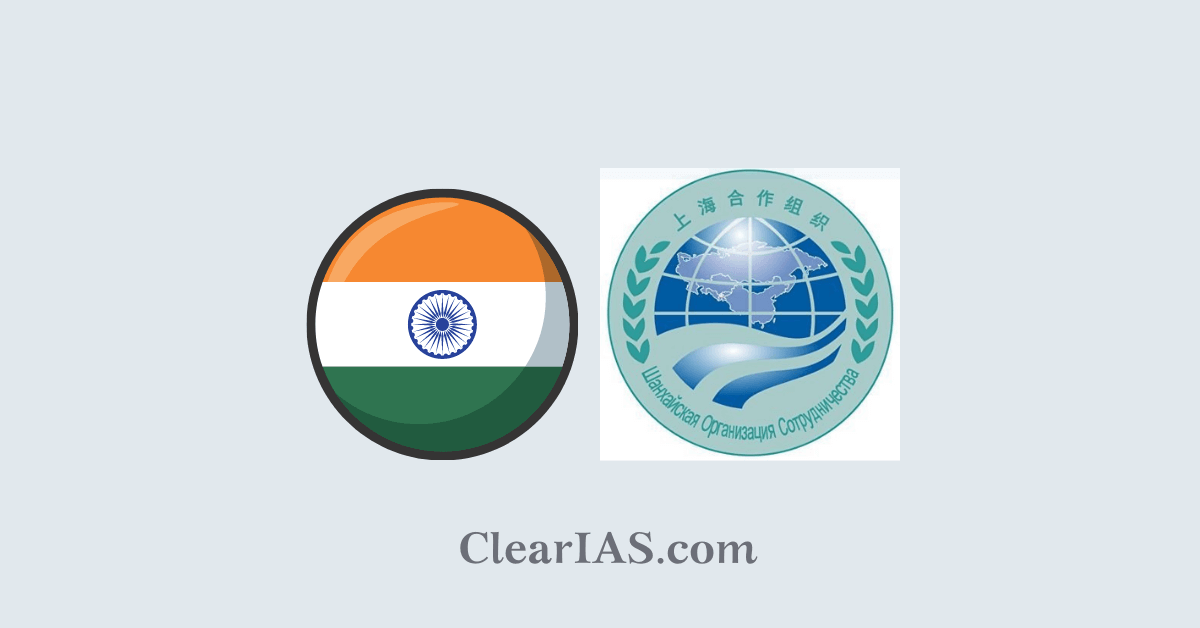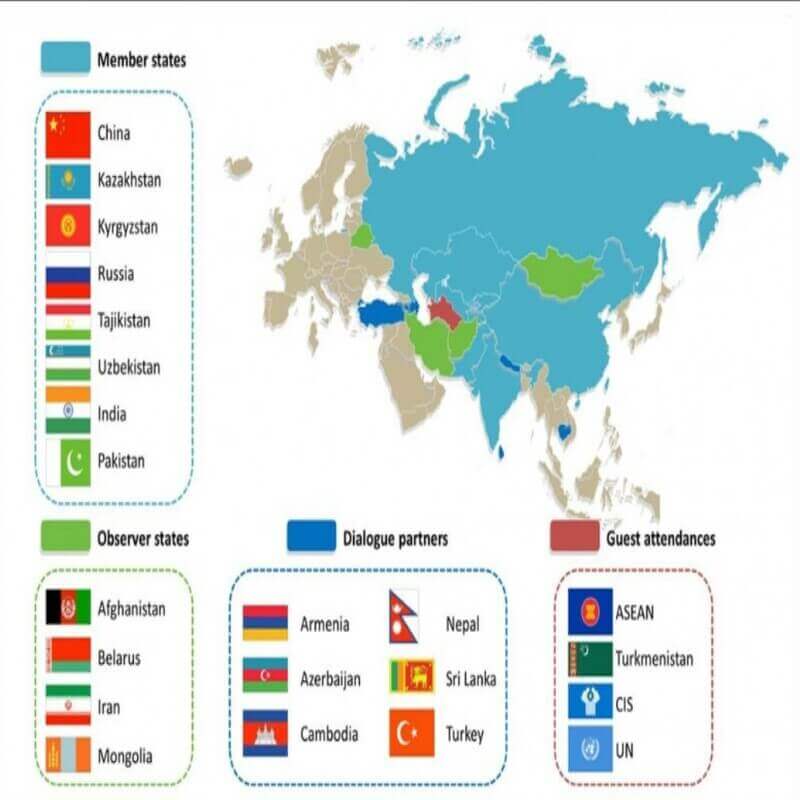
- External Affairs Minister S. Jaishankar represented India at a meeting of the Council of Heads of Government of the Shangai Cooperation Organisation (SCO) on November 25th
- “The 20th Meeting of SCO Council of Heads of Government (CHG) will be held on November 25 in Nur-Sultan in virtual format under the chairmanship of Kazakhstan,” the Ministry of External Affairs (MEA) said.
What is the Shangai Cooperation Organisation (SCO)?
The Shanghai Cooperation Organisation (SCO) is a permanent intergovernmental international organisation, created on 15 June 2001 in Shanghai (China). The founding members are:
- The Republic of Kazakhstan
- The People’s Republic of China
- The Kyrgyz Republic
- The Russian Federation
- The Republic of Tajikistan
- The Republic of Uzbekistan.
It was preceded by the Shanghai Five mechanism (1996) formed by the leaders of China, Russia, Kazakhstan, Kyrgyzstan, and Tajikistan.
The SCO Charter was signed during the St.Petersburg SCO Heads of State meeting in June 2002 and entered into force on 19 September 2003. This is the statutory document that outlines the organisation’s goals and principles, as well as its structure and core activities.
The meeting of the Heads of State Council of the Shanghai Cooperation Organisation in 2017 in Astana gave the status of a full member of the Organization to India and Pakistan.
The SCO’s main goals are as follows:
- Strengthening mutual trust and neighbourliness among the member states
- Promoting their effective cooperation in politics, trade, the economy, research, technology, and culture, as well as in education, energy, transport, tourism, environmental protection, and other areas.
- Making joint efforts to maintain and ensure peace, security, and stability in the region
- Moving towards the establishment of a democratic, fair and rational new international political and economic order.
The Heads of State Council (HSC) is the supreme decision-making body in the Shanghai Cooperation Organisation. It meets once a year and adopts decisions and guidelines on all important matters of the organisation.
The SCO Heads of Government Council (HGC) meets once a year to discuss the organisation’s multilateral cooperation strategy and priority areas, resolve current important economic and other cooperation issues, and also to approve the organisation’s annual budget.
The SCO’s official languages are Russian and Chinese.
The organisation has two permanent bodies-
- The SCO Secretariat based in Beijing
- The Executive Committee of the Regional Anti-Terrorist Structure (RATS) is based in Tashkent.
Present members of the Shanghai Cooperation Organisation

- The Republic of India
- The Republic of Kazakhstan
- The People’s Republic of China
- The Kyrgyz Republic
- The Islamic Republic of Pakistan
- The Russian Federation
- The Republic of Tajikistan
- The Republic of Uzbekistan
Observer states:
- The Islamic Republic of Afghanistan
- The Republic of Belarus
- The Islamic Republic of Iran
- Mongolia
Dialogue partners:
- The Republic of Azerbaijan
- The Republic of Armenia
- The Kingdom of Cambodia
- The Federal Democratic Republic of Nepal
- The Republic of Turkey
- The Democratic Socialist Republic of Sri Lanka.
India and Shangai Cooperation Organisation (SCO)
Shanghai Cooperation Organisation (SCO) is seen as an eastern counter-balance to NATO and India’s membership will allow the country to push effective action in combating terrorism and security issues.
The presence of India and China, the world’s most populous countries, makes the Shanghai Cooperation Organisation the organisation with the largest population coverage.
India for the first time hosted the heads of government (HoG) meeting of the Shanghai Cooperation Organisation, three years after joining the eight-nation group in 2020.
- The SCO’s significance for India mainly lies in economics and geopolitics with the Eurasian states.
- SCO is a potential platform to advance India’s Central Asia policy. The SCO member states are India’s extended neighbourhood where India has both economic and security imperatives.
- The SCO-Afghanistan Contact Group, which aims to stabilize Afghanistan, provides India with a vital counterweight to some of the other groupings it is a part of.
- The SCO provides the only multilateral platform for India to deal with near Pakistan and Afghanistan.
- Acknowledging the strategic importance of the region and SCO, the Indian Prime Minister had articulated the foundational dimension of Eurasia as being SECURE
- S for the Security of our citizens,
- E for Economic development for all,
- C for Connecting the region,
- U for Unite our people,
- R for Respect for Sovereignty and Integrity, and
- E for Environmental protection.
Challenges ahead of India
- Central Asia connectivity: a major thorn in India’s engagement with Eurasia remains Pakistan’s denial of direct land connectivity to Afghanistan and beyond. The lack of connectivity has dampened the development of energy ties between the hydrocarbon-rich region and India
- Russia- China: Initially, Russia pushed India’s inclusion into the Shanghai Cooperation Organisation to balance China’s power. However, Russia and China are growing closer, and India has been promoting better relations with the US.
- Belt and Road Initiative: While India has made its opposition to BRI clear, all other SCO members have embraced the Chinese project.
- India-Pakistan: SCO members have, in the past, expressed fears of the organisation being held hostage to India’s and Pakistan’s adverse relationship.
In news
The heads of government meeting of the Shanghai Cooperation Organisation (SCO) was attended by India, Pakistan, China, Russia and six other member countries on Wednesday (October 17, 2024).
External Affairs Minister S Jaishankar travelled to Islamabad for the meeting, the first such visit in nine years.
Key highlights of the Shanghai Cooperation Organisation summit:
- India highlighted three evils i.e. Terrorism, extremism and separatism against regional peace and development.
- India did not endorse China’s Belt and Road Initiative on grounds of territorial integrity and sovereignty.
- The meeting saw criticism of “unilateral sanctions” that Western nations have imposed e.g. on Russia.
- The meeting further advanced India’s digital agenda, incorporating Digital Public Infrastructure (DPI) and digital inclusion into the SCO cooperation framework.
Way Forward
- India needs to improve connectivity with Central Asia through the Chabahar port and enter into the Ashgabat agreement should be utilized for a stronger presence in Eurasia along with a focus on the International North-South Corridor (INSTC).
- India and China must co-exist peacefully for the era to be viewed as the Asian century.
- SCO’s goal of promoting economic cooperation, trade, energy, and regional connectivity should be used to improve relations with Pakistan and persuade it to unblock India’s access to Eurasia and impetus to projects like
- The increasing terrorist activities in the region make it imperative for Shanghai Cooperation Organisation countries to develop a ‘cooperative and sustainable security’ framework and make the Regional Anti-Terrorist Structure more effective.
The Eurasian strategy should be envisioned to serve India’s regional interests to ensure nation-building through development partnerships, maintaining sovereignty, and preventing the region from terrorism and extremism.
Potential Mains GS-II Question
Discuss the importance of the Shanghai Cooperation Organisation to India’s Eurasian policy. (200 words)






Leave a Reply